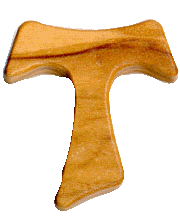
|
St. Benedict the Moor Benedict was born to African slaves who were brought from Africa to Messina, Sicily. There they converted to Christianity and lived an exemplary life. Benedict grew up on the farm working as slave like his parents. His master freed him from slavery on his eighteenth birthday. He then began earning wages as a farm worker. When he had enough money, he bought a pair of oxen to help him plow the fields. He also shared with the poor and helped cared for the sick. The people nicknamed him "il moro santo" meaning "black saint" which has been mistranslated as "the Moor" incorrectly identifying his ethnic and religious roots. In time, he became acquainted with some hermits who followed the rule of St. Francis. Attracted to their way of life and wanting to dedicate his life to God, he sold his small possessions and gave everything to the poor. He joined the hermits in the vicinity of Palermo. When their leader died, this group of hermits made Benedict their leader. In 1562, Pope Pious IV ordered the hermits to join the established religious orders. Benedict joined the Order of Friars Minor at Palermo. At the friary, he served as a cook. He practiced poverty and humility. He followed the examples of St. Francis observing the forty days fast seven times a year, sleeping only a few hours at night on a bare floor, and wearing a very coarse habit. He was appointed novice master and then guardian of the friary in Palermo even though he was only a brother. As guardian, he corrected the friars with humility and charity. When his term was up, he gladly returned to his duties as cook in the kitchen. Often, he was visited by people of all conditions like the poor asking for alms, the sick wanting to be healed, even famous people asking for advice and prayers. He responded to their needs with compassion. Benedict died on April 4, 1589 at the exact hour he foretold. King Phillip III of Spain paid for a special tomb for him. Several years later, his body was found incorrupt, emitting a pleasant odor. Pope Pious VII canonized him in 1807. St. Benedict, the Moor is honored as the patron saint of African-Americans. |